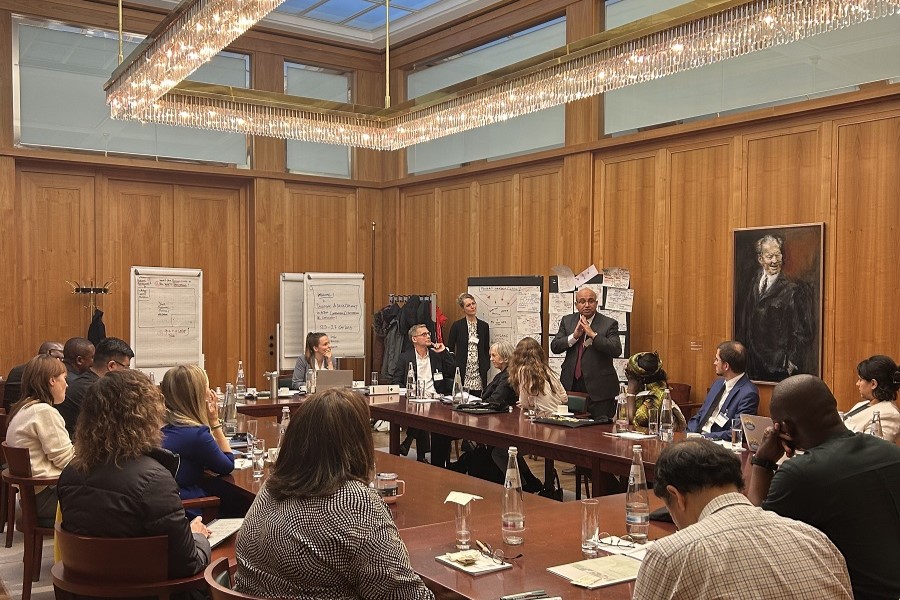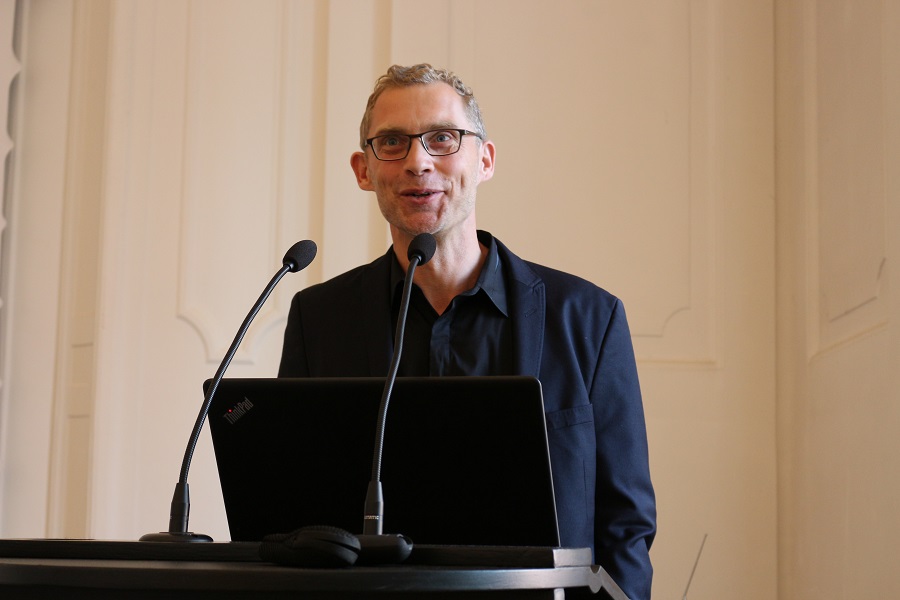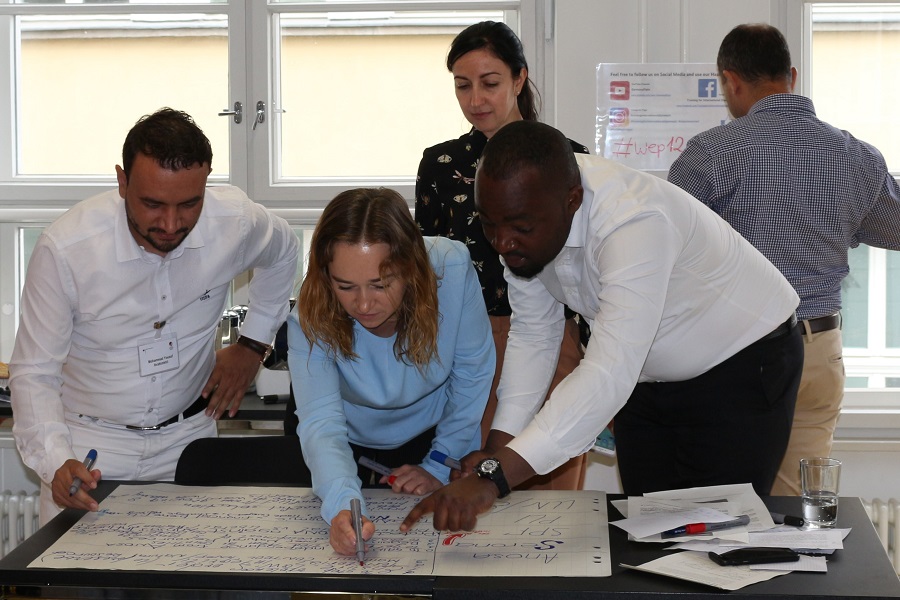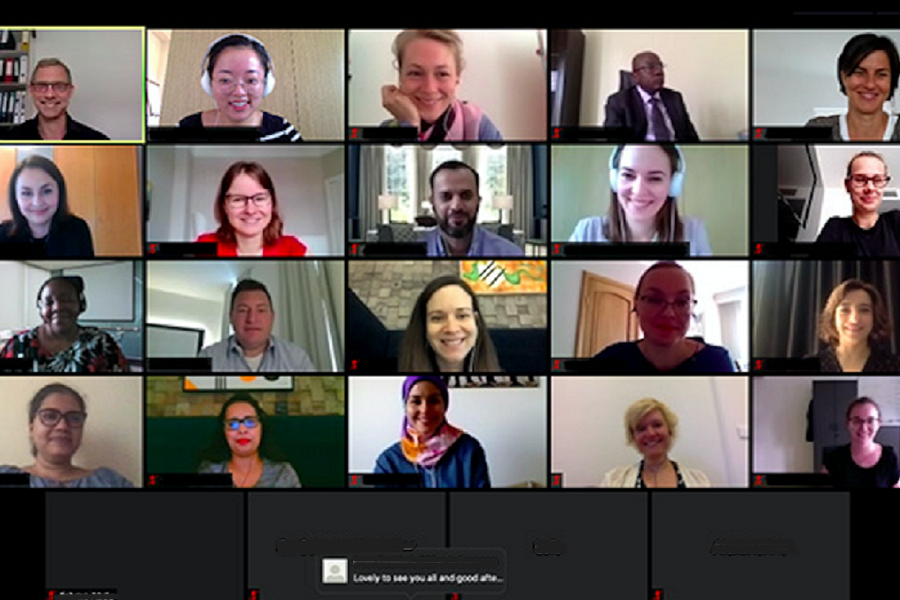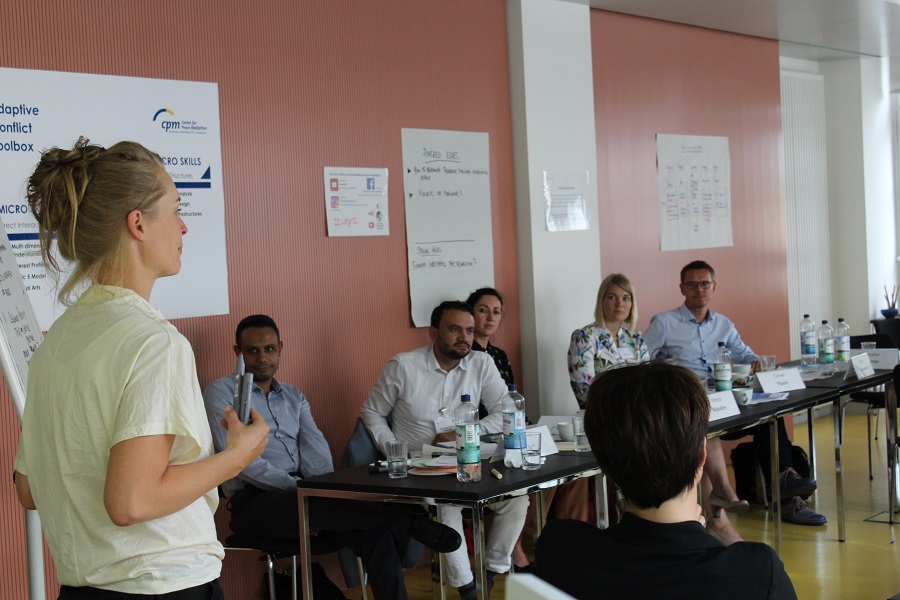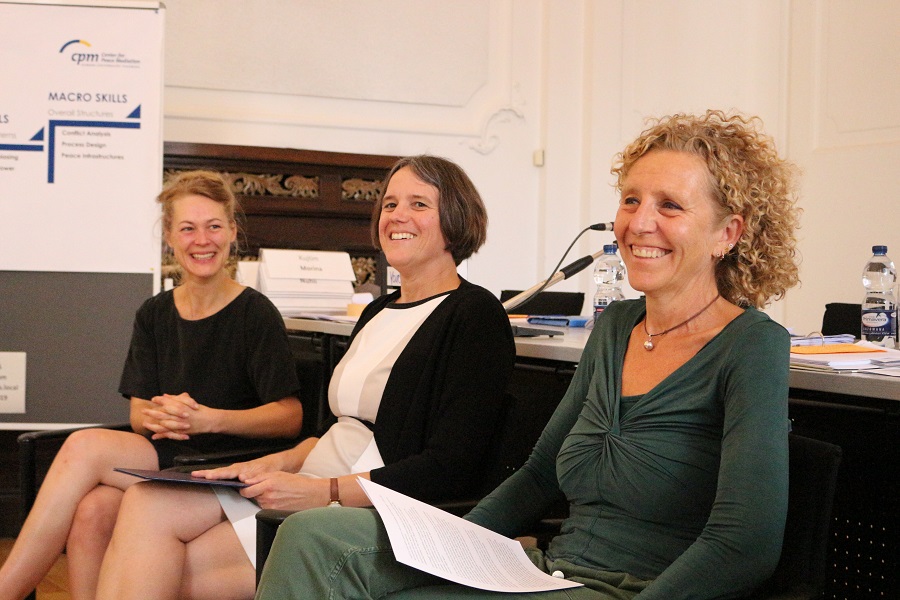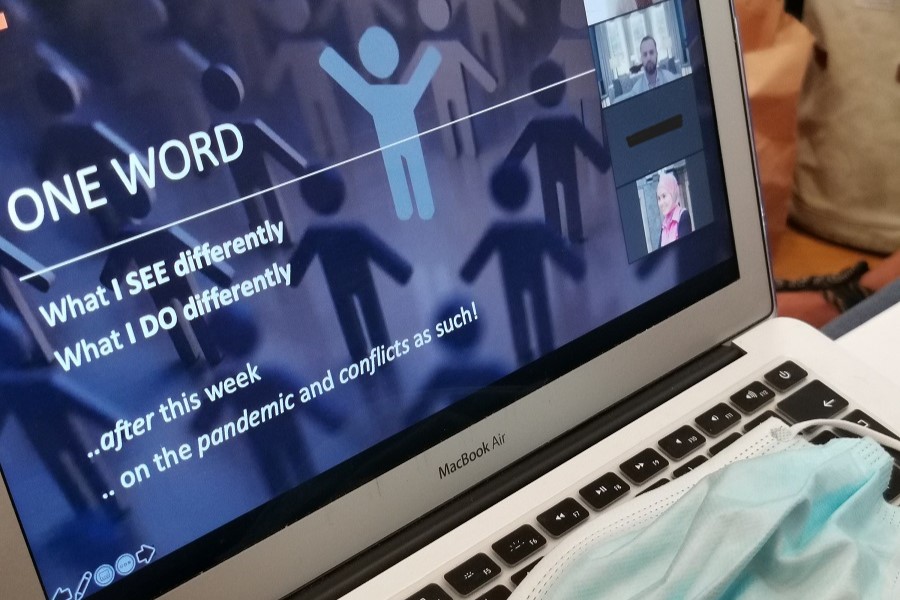Capacity building in mediation & dilemma management
General information
The Center for Peace Mediation conducts a series of activities, some of them on a regular basis, in which actors from diplomacy, civil society and academia can strengthen their capacities for dealing with conflict.
The following selection offers an overview of exemplary non-university teaching activities that take place alongside the Center's university teaching.
Peace Mediation & Crisis Diplomacy in Action
With the "Peace Mediation and Diplomacy in Action" programme, the German Federal Foreign Office's Training for International Diplomats responded to the growing importance of peace mediation as an instrument of crisis diplomacy and value- and interest-based foreign policy. From 2016 to 2023, a five-day Network Consolidation Programme for International Diplomats on the topic of "Peace Mediation and Crisis Diplomacy in Action" took place every year in close cooperation between the Federal Foreign Office and the CPM. The programme was aimed at international diplomats, think tankers and academics who are involved in conflict mediation and dialogue processes or can envisage a role in this area in the future.
The programme offered an introduction to the tools of peace mediation, process design and dilemma management and provided spaces to critically reflect on the role of mediation in state foreign policy. On this basis, the annually reconstituted group of participants analysed a current crisis or conflict scenario and developed concrete process approaches and solution strategies. The programme ended with a tailored 1-to-1 coaching session in which participants transfered the insights and skills gained to their own working contexts and identified their potential contribution to (future) mediation initiatives in their region.
Image recordings from training sessions
Programmes for the individual years
In 2023, the programme focused on new needs and options for dialogue in and with Eastern Europe: diplomatic cooperation and civil society projects faced particular challenges in light of Russia's war of aggression against Ukraine and an increasing geopolitical polarisation. The new fragility of the security balance in Europe, major shifts in geopolitical alliances and the relative strengths of countries highlighted a need for new strategies for dialogue in and with Eastern Europe.
Against this challenging backdrop, the 2023 programme explored how new methods and formats of dialogue can help address issues and relationships in the face of a world order and European Union shaken by the war in Ukraine. The programme also focused on Germany's untapped potential for reshaping roles and relationships with and between its Eastern European partners: Poland, Ukraine and Russia. The programme aimed to outline some small but visionary and yet achievable scenarios for the urgently needed new European security architecture and to identify Germany's role in the implementation of this architecture.
To the Viadrina Logbuch entryIn view of the massive changes in the international conflict, peace and security landscape in 2022, this year's programme was designed to fundamentally rethink approaches to peace mediation and crisis diplomacy. The focus was on numerous questions about how the new challenges and the necessary realism following the Russian invasion of Ukraine should be reflected in future dialogue and mediation practices: For example, under what conditions and with what objectives do negotiations make sense during an ongoing war? How can we negotiate with conflict actors who are prepared to break basic norms and agreements, commit war crimes and deliberately spread propaganda? Is an honest interest-based dialogue possible when there is absolute mistrust between the parties?
The programme provided space to discuss these and other questions in view of the war between Russia and Ukraine and Western states and resulting developments and dynamics in the OSCE region. The participants were people from the conflict context, people working in or on this conflict context and actors who contributed valuable perspectives from outside.
To the post of the Federal Foreign OfficeThe 2021 programme was dedicated to the increasing social polarisation and growing mistrust in political systems and procedures that blocked open social dialogue and peace processes in many countries and conflict contexts.
Triggered by emancipation or secessionist movements or nationalist reactions to coronavirus restrictions, a shift towards polarisation was observed in many societies.
The programme responded to the need for specific formats and techniques for dealing with these polarisation dynamics. The focus was on both international mediation efforts and domestic political dialogue processes. Representatives from diplomacy and civil society jointly explored how mediation and dialogue methods could be used to deal constructively with social divisions. The spectrum of approaches discussed ranged from mapping actors, driving factors and dynamics of polarisation in different contexts to overcoming dilemmas of social integration and competing narratives and truths.
To the post of the Federal Foreign OfficeIn 2020, the programme focused on bringing together conflict mediation and COVID-19. Diplomats, civil society and security actors from 18 countries worked together to explore how to use mediation and other problem-solving methods to constructively deal with crisis-related tensions in their respective professional roles and working contexts. The scenarios discussed by the participants ranged from pandemic management in the context of the deadlocked violent conflict in Yemen and the social polarisation in Germany triggered by coronavirus policies to new cooperation dilemmas in C19 vaccine development. Of particular interest were approaches that used the health crisis to incentivise positive change, such as a tree planting programme in Pakistan or the regulation of migrant labour in the EU.
The programme was tailored to the travel restrictions imposed by COVID-19 and took place in a mix of face-to-face and online formats. It was conducted in close cooperation with external experts from the Swiss Federal Department of Foreign Affairs. The Märkische Oder Zeitung published a report on the programme.
To the Viadrina Logbuch entryIn 2019, the programme was dedicated to the topic "Managing Difficult Decisions and Dilemmas in Societal Transitions". Peace mediation and crisis diplomacy are full of inherent dilemmas, especially in times of societal change: Should mediators work with and in autocratic systems, for example, even if this could stabilise these systems? Should mediators allow radical religious leaders to agree to peace at the expense of hard-won gender equality?
The focus of the programme was on how to deal constructively with such dilemmatic issues, where mediators – even with the best of intentions – seem to run the risk of causing harm. Together with guests from the German and Swiss foreign ministries, the participants from 12 countries worked on new approaches to social tensions in their regions.
To the Viadrina Logbuch entryUnder the title "New Dynamics for Stable Stalemates: Multitrack Mediation Perspectives in Stuck Conflicts", the 2018 programme focused on deadlocked conflicts and protracted dilemma scenarios. Special emphasis was given to underlying taboos and how to deal with them constructively, using creative formats and simulations. The participants each contributed own practical examples for a joint conflict analysis and developing mediation and dilemma management approaches.
The 2017 programme offered an overview of the German strategy in the field of peace mediation and – with a focus on the peace mediation approaches of the United Nations and the African Union – an insight into various methods, models and concepts used by peace mediation practitioners worldwide.
Participants brought in their own conflict scenarios in order to jointly analyse and develop the potential for mediation approaches in practice. The interactive processing of real case studies enabled the participants to train and develop their skills in mediation, conflict analysis and process design.
In 2016, the programme offered insights into the inner workings of peace mediation in the context of current conflicts in the OSCE area. First, the role and potential of mediation micro skills in those conflict was explored, e.g. through reformulating reactive devaluation and accusation into self-statements and determining the true interests of conflicting parties. Second, macro skills of conflict analysis and process design were used to develop unorthodox starting points for ceasefire negotiations or comprehensive peace processes.
Mediation training for diplomats
As part of the country programmes of the International Diplomatic Academy of the Federal Foreign Office, the CPM regularly holds one- to three-day mediation workshops on mediation and conflict management for diplomats from various countries since 2006. Often, tThe focus is often on Ukraine and other Eastern European countries. Each workshop is based on the specific scenarios and approaches that the participants bring with themin from their own contexts. In the workshops, they It is not uncommon for them to develop concrete building blocks in the workshops, such as differentiated interest profiles or new dilemma strategies, which they take directly into their work contexts.
Every year, the German Federal Foreign Office and the Swiss Federal Department of Foreign Affairs (FDFA) jointly organise a five-day training course on peace mediation for Swiss, German, Norwegian and Finnish diplomats. The interactive training includes various mediation methods and approaches, micro-skills, process design, a one-day case simulation and an overview of the mediation support infrastructures in Germany, Switzerland, Finland, Norway and the United Nations. Furthermore, experienced German and Swiss diplomats report on their experiences in conflict regions. The training is a cooperation between the Initiative Mediation Support Deutschland (IMSD), of which the Center for Peace Mediation is a member organisation, and the Mediation Support Project (Center for Security Studies ETH Zurich and swisspeace).
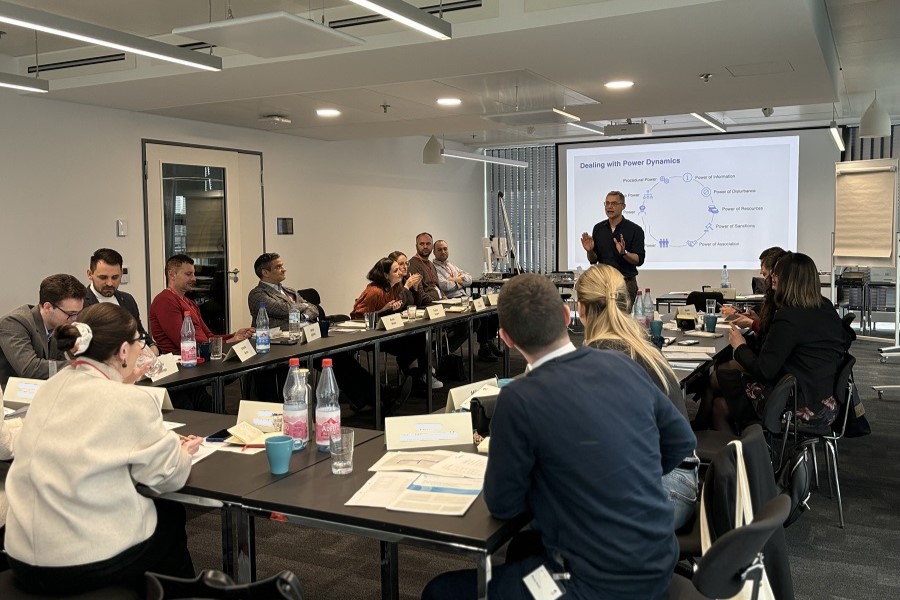
AA/1DA
International Parliamentary Scholarship
The German Bundestag, in cooperation with Freie Universität Berlin, Humboldt-Universität zu Berlin and Technische Universität Berlin, awards around 120 scholarships to young university graduates from 50 countries every year. The aim of the International Parliamentary Scholarship (IPS) is to promote good intergovernmental relations, consolidate democratic values and tolerance and gain a deeper understanding of cultural diversity. Participants from Central, Eastern or South-Eastern Europe, France, Israel, North America, Latin America, the Asia-Pacific or Arab region, Namibia or South Africa spend five months familiarising themselves with the work of the Bundestag, including three months of internship at the office of a member of parliament.
As part of the IPS programme, the Center for Peace Mediation offers a one-day workshop on basic instruments of conflict analysis and methods of international conflict management, including an interactive simulation and a transfer of learnings to the participants’ own professional roles. The workshop offers participants a safe space to discuss sensitive questions regarding conflicts in their home regions, e.g. in the Middle East or the Russian war against Ukraine, including Germany´s often contested roles in it.
Process support to local actors in Odesa, Ukraine
Against the background of violent clashes between "pro-Ukrainian" and "pro-Russian" groups in Odesa in early 2014, the Center for Peace Mediation, in cooperation with CSSP and inmedio, started the project "The Common House: Supporting and Broadening Dialogue Processes in Odesa". The support project built on the findings of a pilot workshop that the three organisations held in Odesa in 2014 with local dialogue actors and was funded by the German Federal Foreign Office.
In a series of workshops and other activities, a core group of local actors was formed in 2014 and 2015. The group organised and implemented various dialogue activities at local level in Odesa. In December 2015, the actors involved founded the "Civil Initiative Space for Dialogue" platform in Odesa.
The Center for Peace Mediation's contributions to their support included the facilitation of a three-day workshop, ten days of field research with expert interviews, coaching sessions for dialogue actors in Odesa, as well as research support for Ukrainian dialogue researchers.
An analysis of the results of the expert interviews is also available in Ukrainian.
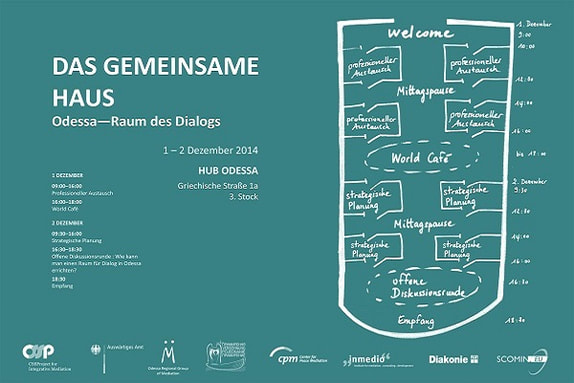
IKM
Professionalisation of peace mediation in German foreign policy
In 2013, the Berghof Foundation, CSSP - Berlin Centre for Integrative Mediation, inmedio, the ZIF - Centre for International Peace Operations and the Center for Peace Mediation formed a joint advisory group on the issue of Germany's contribution to peace mediation and mediation support. Under the umbrella of the Initiative Mediation Support Deutschland (IMSD), the group developed joint projects (e.g. The Common House: Support for dialogue processes in Odesa, Ukraine) and organized conceptial and strategic exchange with the German Bundestag and the German Federal Foreign Office. It provided input to the German Bundestag's Subcommittee on Civilian Crisis Prevention, Conflict Transformation and Networked Action and supported the professionalization of peace mediation in German foreign policy through various activities.
One of the first events was the conference "Germany as a mediator. Peace Mediation and Mediation Support in German Foreign Policy" (English version) in November 2014. It focuses on external expectations and ideas regarding Germany's role in international peace mediation, possibilities for anchoring mediation and mediation support in institutional structures as well as overlaps and interactions between diplomacy and mediation. This was followed by the Expert Meeting "Identifying Mediation Entry Points" in October 2015 and the conference "The OSCE as Mediator. Instruments - Challenges - Potentials" which included a panel on "Protracted conflicts and their Multi-Dimensionality for Mediation: Kick-off Examples from the Transdniestrian Settlement Process" facilitated by Lars Kirchhoff and Julia von Dobeneck.
Since 2016, the IMSD and the Federal Foreign Office jointly developed a Fact Sheet series on basic terms, concepts and methods of peace mediation. The IMSD also publishes statements and position papers in response to current debates, e.g. on the preconditions for negotiations between Russia and Ukraine.
Professionalisation of peace mediation in the EU
In 2011, 2012 and 2013, the Center for Peace Mediation, in cooperation with swisspeace and mediatEUr, supported the EU in professionalising its capacities in the field of peace mediation. The programme comprised three days of intensive training and individual coaching for officials of the European External Action Service (EEAS) and representatives of EU Member States. The courses were organised by the EEAS in cooperation with the European Institute of Public Administration (EIPA).
Both the training and the coaching were tailored to the specific needs and requirements of the participants, who work in or on conflicts as process facilitators, counsellors or mediators. The curriculum enabled participants to improve their knowledge and skills in the areas of communication, conflict analysis and mediation and to develop responses to the specific methodological and structural challenges of mediation offered and supported by the EU.
Series of symposia on international peacebuilding
In cooperation with the Humboldt-Viadrina School of Governance, the CPM organized the symposium series "Mediation Methods in International Peace Engagement" from 2008 to 2011. The series served as a platform for exchange between key political and civil society actors in the field of peace mediation.
Programmes for the individual years
The aim of the symposium on 23 June 2011 was to identify and discuss the challenges and questions in establishing peace mediation in the context of the EU. Peace mediation in current EU activities on the ground, normative and methodological challenges and political and institutional perspectives were discussed in three panels. Participants recognised the EU's unique opportunity to use its historical credibility, current political influence and extensive knowledge of mediation to establish itself as a professional mediation actor on the international stage.
- Conference report (German): "Peace Mediation im Kontext der EU. Momentaufnahme eines Etablierungsprozesses.Auswertung und Kommentierung des Expertensymposiums vom 23. Juni 2011 in Berlin"
- Conference report (English): "Peace Mediation in the EU Context. State of Play of the Establishment Process. Analysis of and comments on the experts' symposium held in Berlin on 23 June 2011"
The symposium on February 11-13, 2010, focused on structures, limits and interventions in peace mediation processes. Based on the work of NGOs, the European Union and the German government, different aspects of peace missions in crisis regions were examined, typical obstacles and dilemmas in international peace negotiations were analyzed and possible coping strategies were developed. A key question was to which extent the classic model of interest-based conflict management can be transferred to the international context and where the challenges and limitations of such a transfer lie.
From April 3 to 5, the participants of the 2008 symposium analyzed and evaluated peace mediation actors and activities in view of their roles in ongoing conflicts and peace missions. Particular attention was paid to the role and profile of the United Nations Mediation Support Unit and international NGO as well as the resulting perspectives for German and European foreign policy on mediation in peace processes. Using case studies and training simulations, participants discussed and tested practical mediation approaches for peace processes. They concluded that there is a systematic need to optimize mediation support for international peace processes, particularly in terms of methodology, in order to cope with the systemic complexity of international conflicts.
- German conference report: "Mediative Methoden in der internationalen Friedensförderung"
Capacity Building in Conflict Management with Leaders of Afghan civil society
In 2009 and 2010, the Center for Peace Mediation, together with swisspeace and Transparency International, participated in a capacity-building programme for Afghan civil society leaders, which was led by the Humboldt-Viadrina School of Government and funded by the German Federal Foreign Office.
The aim of the programme was to sustainably strengthen the discourse, societal participation and conflict management skills of key actors and multipliers in Afghan civil society and administration. The programme focused on the acquisition of knowledge and skills in the field of mediation methods and the strengthening of existing conflict management resources. What was new about the training concept was its direct practical orientation and the collaboration of trainers from politics, civil society and science.
In July 2009, a two-week training programme on conflict management and transparency was held in Berlin for Afghan NGO representatives and officials from the Kunduz provincial government. The CPM training focussed on practical exercises in conflict analysis and interest-based mediation. In bilateral coaching sessions, the participants honed their individual skills and worked on specific contextual challenges. In the course of the two-years programme, they developed a conflict management or anti-corruption project for their respective local community (e.g. a radio programme) based on their professional networks and infrastructures.
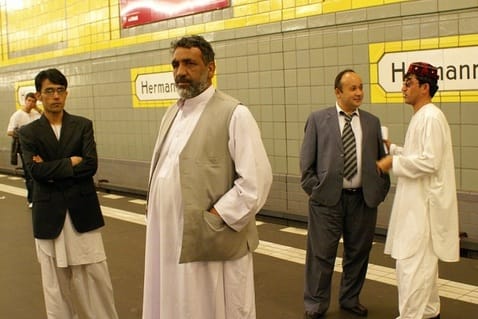
IKM

